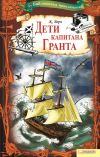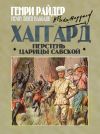Читать книгу "Дети капитана Гранта / The Children of Captain Grant"

Автор книги: Жюль Верн
Жанр: Иностранные языки, Наука и Образование
Возрастные ограничения: 12+
сообщить о неприемлемом содержимом
Chapter V. The Departure of the Duncan
We have said already that Lady Helena was a brave, generous woman. Her husband had good reasons to be proud of such a wife. The idea of going to Captain Grant’s rescue had occurred to him in London when his request was refused. But now she herself proposed to go!
There was not an hour to be lost. A telegram was dispatched to John Mangles the very same day, conveying Lord Glenarvan’s orders to take the Duncan immediately to Glasgow, and to make preparations for a voyage to the Southern Seas, and possibly round the world, if necessary.
The Duncan was a steam yacht of the finest description. It had two masts; its engine, which was constructed on a new system, was a high-pressure one, of 160-horse power. It made seventeen miles an hour, a higher speed than any vessel had yet attained.
John Mangles understood his business[29]29
understood his business – знал своё дело
[Закрыть]. Though he was only the captain of a pleasure yacht[30]30
pleasure yacht – увеселительная яхта
[Закрыть], he was one of the best skippers in Glasgow. He was thirty years of age, and his countenance expressed both courage and goodness. When Lord Glenarvan offered him the command of the Duncan, he accepted it with right good will, for he loved the master of Malcolm Castle, like a brother.
Tom Austin, the mate, was an old sailor, worthy of all confidence. The crew, consisting of twenty-five men, including the captain and chief officer, were all experienced sailors. And when the crew heard the news, they could not restrain their enthusiasm.
John Mangles did not forget to fit up the rooms of Lord and Lady Glenarvan for a long voyage. He had also to get cabins ready for the children of Captain Grant, as Lady Helena could not refuse Mary’s request to accompany her. As for young Robert, he was put in charge of John Mangles.
To complete the roll of passengers, we must name Major McNabbs. The Major was about fifty years of age, with a calm face and regular features—a man who did whatever he was told, of an excellent, indeed, a perfect temper; modest, silent, peaceable, and amiable, agreeing with everybody on every subject, never discussing, never disputing, never getting angry. Nothing could excite him, nothing could disturb him. As a cousin of Glenarvan, he lived in Malcolm Castle, and as a major he went with the Duncan.
The ship was to sail out with the tide at three o’clock on the morning of the 25th of August.
Chapter VI. An Unexpected Passenger
The sea was calm. McNabbs was talking to himself, as was his habit. He stood motionless, watching the track of the yacht. After some minutes of this silent contemplation he turned round, and suddenly found himself face to face with a stranger.
He was a tall, thin man, about forty years of age, and resembled a long nail with a big head. His head was large and massive, his forehead high, his chin very marked. His eyes were concealed by enormous round spectacles, and in his look was that peculiar indecision which is common to nyctalopes[31]31
nyctalopes – никталопы
[Закрыть], or people who have a peculiar construction of the eye, which makes the sight imperfect in the day and better at night. It was evident that he was a lively, intelligent man.
The stranger’s excitement was a strong contrast to the Major’s placidity. He walked round McNabbs, looking at him and questioning him with his eyes.
The mysterious passenger seized his telescope, drew it out to its fullest extent, about four feet, and began gazing at the horizon, standing motionless with his legs wide apart. His examination lasted some few minutes, and then he lowered the glass.
McNabbs never moved a muscle of his face. This was too much for the stranger, and he called out, with an unmistakably foreign accent:
“Steward!”
He waited a minute, but nobody appeared, and he called again, still louder, “Steward!”
Mr. Olbinett[32]32
Olbinett – Олбинет
[Закрыть] was passing that minute on his way from the galley.
“Who is he?” he thought to himself. “He can not possibly be one of Lord Glenarvan’s friends?”
He approached the unknown personage, who accosted him with the inquiry, “Are you the steward of this vessel?”
“Yes, sir,” replied Olbinett; “but I have not the honor of—”
“I am the passenger in cabin Number 6.”
“Number 6!” repeated the steward.
“Certainly; and your name, what is it?”
“Olbinett.”
“Well, Olbinett, my friend, we must think of breakfast, and that pretty quickly. It is thirty-six hours since I have had anything to eat, or rather thirty-six hours that I have been asleep—pardonable enough: I was going, without stopping, from Paris to Glasgow. What is the breakfast hour?”
“Nine o’clock,” replied Olbinett, mechanically.
“Ah, well,” said the stranger, “it is only eight o’clock at present. Bring me a glass of sherry and a biscuit while I am waiting.”
The stranger kept on talking incessantly, flying from one subject to another.
“The captain? Isn’t the captain up yet? And the chief officer? What is he doing? Is he asleep still? It is fine weather, fortunately, and the wind is favorable.”
Just at that moment John Mangles appeared at the top of the stairs.
“Here is the captain!” said Olbinett.
“Ah! Delighted, Captain Burton[33]33
Burton – Бёртон
[Закрыть], delighted to make your acquaintance,” exclaimed the unknown.
John Mangles stood stupefied, at hearing himself called “Captain Burton.” But the new comer went on. “Allow me to shake hands with you, sir; and if I did not do so yesterday evening, it was only because I did not wish to be troublesome. But today, captain, it gives me great pleasure to begin my intercourse with you.”
John Mangles opened his eyes as wide as possible, and stood staring at Olbinett and the stranger alternately.
Without waiting for a reply, the fellow continued. “Now the introduction is made, my dear captain, we are old friends. Tell me how you like the Scotia?”
“What do you mean by ‘the Scotia’?” put in John Mangles at last.
“By ‘the Scotia’? Why, the ship we’re on, of course—a good ship that has been commended to me, not only for its physical qualities, but also for the moral qualities of its commander, the brave Captain Burton.”
“Sir,” interrupted John. “I am not Captain Burton.”
“Ah, is that so? Is it Mr. Burdness[34]34
Burdness – Бёрднес
[Закрыть], the chief officer, that I am talking to at present?”
“Mr. Burdness!” repeated John Mangles. He asked himself whether the man was mad. He was beginning to explain the case, when Lord Glenarvan and his party came up. The stranger caught sight of them directly, and exclaimed:
“Ah! The passengers, the passengers! I hope you are going to introduce me to them, Mr. Burdness!”
But he could not wait, and going up to them with perfect grace, said, bowing to Miss Grant, “Madame;” then to Lady Helena, with another bow, “Miss;” and to Lord Glenarvan, “Sir.”
Here John Mangles interrupted him, and said, “Lord Glenarvan.”
“My Lord,” continued the unknown, “I beg pardon for presenting myself to you. I hope we shall soon become acquainted with each other, and that the company of these ladies will make our voyage on the Scotia appear as short as agreeable.”
Lady Helena and Miss Grant were too astonished to be able to utter a single word. Lord Glenarvan was more collected, and said, “Sir, to whom have I the honor of speaking?”
“To Jacques Eliacin Francois Marie Paganel[35]35
Jacques Eliacin Francois Marie Paganel – Жак-Элиасен-Франсуа-Мари-Паганель
[Закрыть], Secretary of the Geographical Society of Paris, Corresponding Member[36]36
Corresponding Member – член-корреспондент
[Закрыть] of the Societies of Berlin, Bombay, Darmstadt, Leipzig, London, St. Petersburg, Vienna, and New York; Honorary Member[37]37
Honorary Member – почётный член
[Закрыть] of the Royal Geographical and Ethnographical Institute of the East Indies.”
Chapter VII. Jacques Paganel is Undeceived
The Secretary of the Geographical Society was evidently an amiable personage, for all this was said in a most charming manner. His geographical works, his papers on modern discoveries, and his world-wide correspondence, gave him a most distinguished place among the scientists of France. Lord Glenarvan welcomed such a guest, and shook hands cordially.
“And now that our introductions are over,” he added, “you will allow me, Monsieur Paganel, to ask you a question?”
“Twenty, my Lord,” replied Paganel; “it will always be a pleasure to converse with you.”
“Was it last evening that you came on board this vessel?”
“Yes, my Lord, about 8 o’clock. I jumped into the Scotia, where I had booked my cabin before I left Paris. It was a dark night, and I saw no one on board, so I found cabin No. 6, and went to my berth immediately, for I had heard that the best way to prevent sea-sickness is to go to bed as soon as possible. And, moreover, I had been traveling for thirty hours.”
Paganel’s listeners understood the whole mystery, now, of his presence on the Duncan. The French traveler had mistaken his vessel. All was explained.
“So you wanted to travel to Calcutta, M. Paganel, right?”
“Yes, my Lord, to see India has been a purpose of my life. It will be the realization of my dreams, to find myself in the country of elephants!”
“Monsieur Jacques Paganel,” said Lord Glenarvan, after a brief pause, “I must tell you that you must give up the pleasure of a visit to India.”
“Give it up? And why? What! Captain Burton!”
“I am not Captain Burton,” said John Mangles.
“But the Scotia.”
“This vessel is not the Scotia.”
It would be impossible to depict the astonishment of Paganel. John Mangles could not suppress a smile. At last the poor fellow shrugged his shoulders, pushed down his spectacles over his nose and said:
“You are joking.”
But just at that very moment his eye fell on the wheel of the ship, and he saw the two words on it: Duncan. Glasgow.
“The Duncan! The Duncan!” he exclaimed, with a cry of despair, and rushed down the stairs, and away to his cabin.
“However,” said Lord Glenarvan, “I am not much astonished at it in Paganel. He is quite famous for such misadventures. One day he published a celebrated map of America, and put Japan in it! But for all that[38]38
but for all that – но несмотря на это
[Закрыть], he is one of the best geographers in France.”
“But what shall we do with the poor gentleman?” said Lady Helena; “we can’t take him with us to Patagonia.”
“Why not?” replied McNabbs, gravely. “We are not responsible for his mistakes.”
“Well, if he likes; he can disembark at the first place where we touch.”
While they were talking, Paganel came up again on the poop, looking very woebegone and crestfallen. He kept repeating incessantly the unlucky words, “The Duncan! The Duncan!”
He could find no others in his vocabulary. He gazed inquiringly over the wide ocean, at the far horizon. At length[39]39
at length – наконец
[Закрыть] he accosted Lord Glenarvan once more, and said—
“And this Duncan—where is it going?”
“To America, Monsieur Paganel,” was the reply.
“And to what particular part?”
“To Concepcion.”
“To Chili! To Chili!” cried the unfortunate geographer.
“Come, Monsieur Paganel, don’t despair. It can all be managed. We shall soon put in at Madeira, and you will get a ship there to take you back to Europe.”
“Thanks, my Lord. But people will say it is a most extraordinary adventure, and it is only to me such things happen… But the Duncan is a pleasure yacht, is it not?” began Paganel again, after a fresh examination of the vessel.
“Yes, sir,” said John Mangles, “and belongs to Lord Glenarvan.”
Chapter VIII. The Geographer’s Resolution
Meantime the yacht was making rapid progress toward the equator. On the 30th of August they sighted the Madeira group of islands, and Glenarvan, true to his promise, offered to put in there, and land his new guest.
But Paganel said:
“My dear Lord! Tell me, did you intend to stop at Madeira before I came on board?”
“No,” replied Glenarvan.
“Well, then, if it is all the same to you, we might go on to the Canary Isles[40]40
Canary Isles – Канарские острова
[Закрыть] instead.”
“Certainly. It will not the least interfere with our route.”
“I know it will not, my dear Lord. In the Canary Islands, you see, there is much to study. This is an opportunity, and I should make the ascent of the famous mountain while I am waiting for a ship to take me back to Europe.”
“As you please[41]41
as you please – как вам будет угодно
[Закрыть], my dear Paganel,” said Lord Glenarvan.
Next day, about 2 PM, John Mangles and Paganel were walking on the poop. The Frenchman was assailing his companion with all sorts of questions about Chili, when the captain interrupted him, and pointing toward the southern horizon, said:
“Monsieur Paganel?”
“Yes, my dear Captain.”
“Please look in this direction. Don’t you see anything?”
“Nothing.”
“You’re not looking in the right place. It is not on the horizon, but above it in the clouds.”
“In the clouds? I might well not see. I see nothing.”
“Then you don’t want to see. The weather is bad over there, we cannot go to the islands”.
“Take my advice, Monsieur Paganel,” Lady Helena appeared. “Look. It was providence that sent us the document. The same providence brought you on board the Duncan. Don’t leave it.”
“Shall I say yes, my good friends? Come, now, tell me, you want me very much to stay, don’t you?” said Paganel.
“And want to stay yourself, now, don’t you, Paganel?” returned Glenarvan.
“Exactly,” confessed the learned geographer; “but I was afraid it would be inconsiderate.”
Chapter IX. Through the Straits of Magellan [42]42
The Straits Of Magellan – пролив Магеллана
[Закрыть]
The joy on board was universal when Paganel’s resolution was made known.
The voyage had been made without difficulty. Everybody was full of hope, for in this search for Captain Grant, each day seemed to increase the probability of finding him. The captain was among the most confident on board, but his confidence mainly arose from the longing desire he had to see Miss Mary happy.
As for the learned geographer, he was probably the happiest man in all the southern hemisphere. He spent the whole day in studying maps, which were spread out on the saloon table. Paganel also came across a regular cargo of old books in the chief officer’s chest. They were in a very damaged condition, but among them he found a few Spanish volumes, and determined to master the language of Cervantes[43]43
Cervantes – Сервантес
[Закрыть], as no one on board understood it, and it would be helpful in their search along the Chilian coast. He studied it furiously, and kept constantly muttering Spanish words. He spent his leisure hours in teaching young Robert, and instructed him in the history of the country they were so rapidly approaching.
On the 25th of September, the yacht arrived off the Straits of Magellan, and entered them without delay. This route is generally preferred by steamers on their way to the Pacific Ocean. The exact length of the straits is 372 miles.
Paganel was vexed. He insisted that Patagonia without Patagonians was not Patagonia at all.
But Glenarvan replied:
“Patience, my dear geographer. We shall see the Patagonians yet.”
“I am not sure of it.”
“But there is such a people, anyhow,” said Lady Helena.
“I doubt it much, madam, since I don’t see them.”
“But surely the very name Patagonia means ‘great feet’ in Spanish.”
“Oh, the name is nothing,” said Paganel. “And besides, to speak the truth, we are not sure if that is their name.”
“They are tall,” said Glenarvan.
“I don’t know that.”
“Are they little, then?” asked Lady Helena.
“No one can affirm that they are.”
“About the average, then?” said McNabbs.
“I don’t know that either,” said Paganel.
“But what is the truth?” asked Lady Helena.
“Just this, madame; the Patagonians have short legs, and a large bust. But the Straits of Magellan are very magnificent, even without Patagonians.”
Just at this moment the Duncan was rounding the peninsula between splendid panoramas.
Chapter X. The Course Decided
A week after they had doubled the Cape Pilares[44]44
had doubled the Cape Pilares – обогнули мыс Пилар
[Закрыть], the Duncan steamed into the bay of Talcahuano[45]45
the bay of Talcahuano – бухта Талькауано
[Закрыть], a magnificent estuary, twelve miles long and nine broad. The weather was splendid. From November to March the sky is always cloudless, and a constant south wind prevails.
John Mangles had sailed as near the archipelago of Chiloe[46]46
the archipelago of Chiloe – архипелаг Чилоэ
[Закрыть] as possible, and examined the coast, hoping to discover some traces of the shipwreck: a broken spar, or any fragment of the vessel—but nothing whatever was visible, and the yacht continued its route, till she dropped anchor at the port of Talcahuano.
Glenarvan had a boat lowered immediately, and went on shore, accompanied by Paganel.
“Let us go to the Custom-house,” said Glenarvan.
They were informed that the British Consul lived at Concepcion, an hour’s ride distant. Glenarvan and Paganel were soon within the walls of the great city. They went straight on to the house of her Majesty’s Consul, who received them very courteously. But to the question whether a three-mast vessel, called the Britannia, had gone ashore, he gave a decided negative. No report of such an event had been made to him, or any of the other consuls.
Glenarvan went back to Talcahuano, and made a thorough investigation of the whole seaboard. But it was all in vain. Lord Glenarvan returned to the yacht to report his ill success. Mary Grant and her brother could not restrain their grief. Lady Helena did her best to comfort them by loving caresses, while Jacques Paganel took up the document and began studying it again.
Glenarvan said:
“Paganel! Have we made an erroneous interpretation of the document? Have we mistaken the place where the catastrophe occurred?”
Paganel was silent.
“Besides,” said Glenarvan, “does not the word INDIEN prove we are right?”
“Perfectly so,” replied McNabbs.
“And is it not evident, then, that at the moment of writing the words, the shipwrecked men were made prisoners by the Indians?”
“My Lord,” said Paganel, “even if your other conclusions are right, this, at least, seemed to me irrational.”
“What do you mean?” asked Lady Helena, while all eyes were fixed on the geographer.
“I mean this,” replied Paganel, “that Captain Grant is now a prisoner among the Indians, and I further add that the document states it unmistakably.”
“But that is impossible,” replied Lord Glenarvan.
“Impossible! And why, my noble friend?” asked Paganel, smiling.
“Because the bottle could only be thrown into the sea just when the vessel went to pieces on the rocks, and consequently the latitude and longitude given refer to the actual place of the shipwreck.”
“There is no proof of that,” replied Paganel.
“Except this fact, my dear Paganel, that there was no sea, and therefore they could not fling the bottle into it.”
“Unless they flung it into a river which ran into the sea,” returned Paganel.
This reply was so unexpected, that it made them all completely silent for a minute. Lady Helena was the first to speak.
“What an idea!” she exclaimed.
“And what a good idea,” was Paganel’s rejoinder to her exclamation.
“What would you advise, then?” said Glenarvan.
“My advice is to follow the 37th parallel from the point where it touches the American continent to where it dips into the Atlantic, without deviating from it half a degree, and possibly in some part of its course we shall meet the shipwrecked party.”
“There is a poor chance of that,” said the Major.
“But,” returned Paganel, “we cannot lose it.”
He unrolled a map of Chili and the Argentine provinces as he spoke, and spread it out on the table.
“Just follow me for a moment,” he said, “across the American continent. Let us make a stride across the narrow strip of Chili, and over the Cordilleras of the Andes[47]47
Cordilleras of the Andes – Андские Кордильеры
[Закрыть], and get into the heart of the Pampas. Here are the Rio Negro[48]48
Rio Negro – Рио-Негро
[Закрыть] and Rio Colorado[49]49
Rio Colorado – Рио-Колорадо
[Закрыть], intersected by the 37th parallel, and any of them might carry the bottle on its waters.”
His generous enthusiasm so touched his auditors that, involuntarily, they rose to their feet and grasped his hands, while Robert exclaimed:
“Yes, my father is there!”
“And where he is,” replied Glenarvan, “we’ll manage to go, my boy, and find him. Nothing can be more logical than Paganel’s theory, and we must follow the course he points out without the least hesitation.”
“Monsieur Paganel,” asked Lady Helena, “you have no fear then that if the poor fellows have fallen into the hands of the Indians their lives at least have been spared?”
“What a question? Why, madam, the Indians are not cannibals! Far from it. One of my friends was three years a prisoner among the Indians in the Pampas. A European is a useful being in these countries. The Indians know his value, and take care of him as if he were some costly animal.”
“Go!” said Lord Glenarvan. “And as soon as possible. What route must we take?”
“One that is both easy and agreeable,” replied Paganel.
“Let us see the map,” said the Major.
“You see, my friend,” said Paganel, “it is a straight course. In thirty days we shall go over it, and gain the eastern side before the Duncan.”
“Then the Duncan is to cruise between Corrientes[50]50
Corrientes – мыс Корриентес
[Закрыть] and Cape Saint Antonie[51]51
Cape Saint Antonie – мыс Сан-Антонио
[Закрыть],” said John Mangles.
“Just so.”
“And how is the expedition to be organized?” asked Glenarvan.
“As simply as possible. I think that Lord Glenarvan, our natural leader; the Major, and your humble servant, Jacques Paganel.”
“And me,” interrupted Robert.
“Robert, Robert!” exclaimed Mary.
“And why not?” returned Paganel. “Travels form the youthful mind. Yes, Robert, we four and three of the sailors.”
“Then we can’t accompany you?” said Lady Helena, with a shade of sadness in her eyes.
“My dear Helena, the journey will so soon be accomplished.”
“Yes, I understand, it is all right; and I do hope you may succeed.”
On the 14th, the whole search party assembled in the saloon to bid farewell[52]52
to bid farewell – попрощаться
[Закрыть] to those who remained behind. Glenarvan, Paganel, McNabbs, Robert Grant, Tom Austin, Wilson[53]53
Wilson – Уилсон
[Закрыть], and Mulrady[54]54
Mulrady – Мюлреди
[Закрыть], stood armed with carbines and revolvers. Guides and mules awaited them at the harbor.
“It is time,” said Lord Glenarvan at last.
“Go then, dear Edward,” said Lady Helena, restraining her emotion. “God help you!” she called out.
“Heaven will help us, madam,” shouted Paganel, in reply. “You may be sure we’ll help ourselves.”
At the same moment Lord Glenarvan gave the signal to start, and the Duncan steamed out at full speed toward the broad ocean.









































